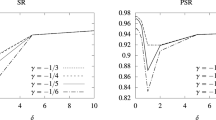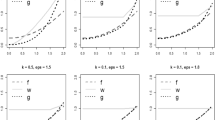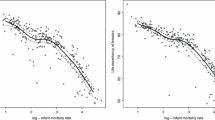Abstract
We propose a weighted bootstrap approach that can improve on current methods to approximate the finite sample distribution of normalized maximal deviations of kernel deconvolution density estimators in the case of ordinary smooth errors. Using results from the approximation theory for weighted bootstrap empirical processes, we establish an unconditional weak limit theorem for the corresponding weighted bootstrap statistics. Because the proposed method uses weights that are not necessarily confined to be uniform (as in Efron’s original bootstrap), it provides the practitioner with additional flexibility for choosing the weights. As an immediate consequence of our results, one can construct uniform confidence bands, or perform goodness-of-fit tests, for the underlying density. We have also carried out some numerical examples which show that, depending on the bootstrap weights chosen, the proposed method has the potential to perform better than the current procedures in the literature.


Similar content being viewed by others
Notes
The inclusion of the random weighting method here is based on the recommendations of an anonymous referee.
References
Achilleos A, Delaigle A (2012) Local bandwidth selectors for deconvolution kernel density estimation. Stat Comput 22:563–577
Ahlgren N, Catani P (2016) Wild bootstrap tests for autocorrelation in vector autoregressive models. Stat Pap 58:1189–1216
Barbe P, Bertail P (1995) The weighted bootstrap. Lecture notes in statistics. Springer, New York
Benšić M, Sabo K (2016) Uniform distribution width estimation from data observed with Laplace additive error. J Korean Stat Soc 45:505–517
Bickel P, Rosenblatt M (1973) On some global measures of the deviations of density function estimates. Ann Stat 1:1075–1095
Bissantz N, Dümbgen L, Holzmann H, Munk A (2007) Nonparametric confidence bands in deconvolution density estimation. J R Stat Soc Ser B 69:483–506
Bouzebda S, Papamichail C, Limnios N (2017) On a multidimensional general bootstrap for empirical estimator of continuous-time semi-Markov kernels with applications. J Nonparametr Stat 30(1):49–86. https://doi.org/10.1080/10485252.2017.1404059
Burch C, Guyader S, Samarov D, Shen H (2007) Experimental estimate of the abundance and effects of nearly neutral mutations in the RNA virus \(\phi \)6. Genetics 176:467–476
Burke M (1998) A Gaussian bootstrap approach to estimation and tests. In: Szyszkowicz B (ed) Asymptotic methods in probability and statistics. North-Holland, Amsterdam, pp 697–706
Burke M (2000) Multivariate tests-of-fit and uniform confidence bands using a weighted bootstrap. Stat Probab Lett 46:13–20
Burke MD (2010) Approximations for a multivariate hybrid process with applications to changepoint detection. Math Methods Stat 19:121–135
Carroll R, Hall P (1988) Optimal rates of convergence for deconvolving a density. J Am Stat Assoc 83:1184–1186
Cator E (2001) Deconvolution with arbitrary smooth kernels. Stat Probab Lett 54:205–215
Cheng G, Huang JZ (2010) Bootstrap consistency for general semiparametric M-estimation. Ann Stat 38:2884–2915
Chesneau C, Fadili J (2013) Wavelet-based density estimation in a heteroscedastic convolution model. Commun Stat Theory Methods 42:3085–3099
Chiang CT, James LF, Wang MC (2005) Random weighted bootstrap method for recurrent events with informative censoring. Lifetime Data Anal 11:489–509
Chiang CT, Wang SH, Hung H (2009) Random weighting and Edgeworth expansion for the nonparametric time-dependent AUC estimator. Stat Sin 19:969–979
Cornelis G, Hassellöv M (2014) A signal deconvolution method to discriminate smaller nanoparticles in single particle ICP-MS. J Anal At Spectrom 29:134–144
Delaigle A, Gijbels I (2004) Practical bandwidth selection in deconvolution kernel density estimation. Comput Stat Data Anal 45:249–267
Delaigle A, Gijbels I (2006) Data-driven boundary estimation in deconvolution problems. Comput Stat Data Anal 50:1965–1994
Delaigle A, Hall P (2014) Parametrically assisted nonparametric estimation of a density in the deconvolution problem. J Am Stat Assoc 109:717–729
Delaigle A, Meister A (2008) Density estimation with heteroscedastic error. Bernoulli 14:562–579
Efron B (1979) Bootstrap methods: another look at the jackknife. Ann Stat 7:1–26
Fan J (1991) Asymptotic normality for deconvolution kernel density estimators. Sankhya Indian J Stat A 53:97–110
Fan J (1992) Deconvolution with supersmooth distributions. Can J of Stat 20:155–169
Fan Y, Liu Y (1997) A note on asymptotic normality for deconvolution kernel density estimators. Sankhya Indian J Stat A 59:138–141
Galvao A, Montes-Rojas G, Olmo J, Song S (2018) On solving endogeneity with invalid instruments: an application to investment equations. J R Stat Soc A 181:1–28
Gao S, Zhong Y (2010) The random weighting estimation of kernel density. J Stat Plan Inference 140:2403–2407
Hall P (1991) On convergence rates of suprema. Probab Theory Relat Fields 89:447–455
Hall P (1992) The bootstrap and Edgeworth expansion. Springer, New York
Hall P, Mammen E (1994) On general resampling algorithms and their performance in distribution estimation. Ann Stat 22:2011–2030
Hesse CH (1999) Data-driven deconvolution. J Nonparametr Stat 10:343–373
Horváth L (2000) Approximations for hybrids of empirical and partial sums processes. J Stat Plan Inference 88:1–18
Horváth L, Kokoszka P, Steinebach J (2000) Approximations for weighted bootstrap processes with an application. Stat Probab Lett 48:59–70
Janssen A (2005) Resampling Student’s t-type statistics. Ann Inst Stat Math 57:507–529
Janssen A, Pauls T (2003) How do bootstrap and permutation tests work? Ann Stat 31:768–806
Kojadinovic I, Yan J (2012) Goodness-of-fit testing based on a weighted bootstrap: a fast large-sample alternative to the parametric bootstrap. Can J Stat 40:480–500
Kojadinovic I, Yan J, Holmes M (2011) Fast large-sample goodness-of-fit for copulas. Stat Sin 21:841–871
Konakov V, Piterbarg V (1984) On the convergence rate of maximal deviation distribution for kernel regression estimates. J Multivar Anal 15:279–294
Kosorok M (2008) Introduction to empirical processes and semiparametric inference. Springer series in statistics. Springer, New York
Kulik R (2008) Nonparametric deconvolution problem for dependent sequences. Electron J Stat 2:722–740
Lacour C (2006) Rates of convergence for nonparametric deconvolution. C R Acad Sci Paris Ser I 342:877–882
Lee M, Shen H, Burch C, Marron S (2010) Direct deconvolution density estimation of a mixture distribution motivated by mutation effects distribution. J Nonparametr Stat 22:1–22
Mason DM, Newton MA (1992) A rank statistics approach to the consistency of a general bootstrap. Ann Stat 20:1611–1624
Masry E (1991) Multivariate probability density deconvolution for stationary random processes. IEEE Trans Inf Theory 37:1105–1115
McIntyre J, Stefanski L (2011) Density estimation with replicate heteroscedastic measurements. Ann Inst Stat Math 63:81–99
Meister A (2009) Deconvolution problems in nonparametric statistics, vol 193. Lecture notes in statistics. Springer, Berlin
Meister A (2010) Density deconvolution in a two-level heteroscedastic model with unknown error density. Electron J Stat 4:36–57
Mojirsheibani M, Pouliot W (2017) Weighted bootstrapped kernel density estimators in two-sample problems. J Nonparametr Stat 29:61–84
Praestgaard J, Wellner JA (1993) Exchangeably weighted bootstraps of the general empirical process. Ann Probab 21:2053–2086
Rubin DB (1981) The Bayesian bootstrap. Ann Stat 9:130–134
Shao J, Tu DS (1995) The Jackknife and bootstrap. Springer series in statistics. Springer, New York
Singh K (1981) On the asymptotic accuracy of Efron’s bootstrap. Ann Stat 9:1187–1195
Stefanski L (1990) Rates of convergence of some estimators in a class of deconvolution problems. Stat Probab Lett 9:229–235
Stefanski L, Carroll R (1990) Deconvoluting kernel density estimators. Statistics 21:169–184
van Es AJ, Kok AR (1998) Simple kernel estimators for certain nonparametric deconvolution problems. Stat Probab Lett 39:151–160
van Es B, Uh H (2004) Asymptotic normality of nonparametric kernel type deconvolution density estimators: crossing the Cauchy boundary. J Nonparametr Stat 16:261–277
van Es B, Uh H (2005) Asymptotic normality of kernel-type deconvolution estimators. Scand J Stat 32:467–483
van Es B, Gugushvili S (2008) Weak convergence of the supremum distance for supersmooth kernel deconvolution. Stat Probab Lett 78:2932–2938
Wand M (1998) Finite sample performance of deconvolving density estimators. Stat Probab Lett 37:131–139
Wang XF, Wang B (2011) Deconvolution estimation in measurement error models: the R package decon. J Stat Softw 39:1–24
Weng CS (1989) On a second-order asymptotic property of the Bayesian bootstrap mean. Ann Stat 17:705–710
Zamini R, Fakoor V, Sarmad M (2015) On estimation of a density function in multiplicative censoring. Stat Pap 56:661–676
Zhang CH (1990) Fourier methods for estimating mixing densities and distributions. Ann Stat 18:06–831
Zheng ZG, Tu DS (1988) Random weighting methods in regression models. Sci Sin Ser A 31:1442–1459
Acknowledgements
This work is supported by the NSF Grant DMS-1407400 of Majid Mojirsheibani.
Author information
Authors and Affiliations
Corresponding author
Appendix
Appendix
1.1 Derivation of (25)
The derivation of (25) is similar to, and easier than, that of (31) given below.
1.2 Derivation of (31)
Since \(\big |\widehat{g}_{nn}(t)-\widehat{g}_n(t)\big |\ge \left( \big |\widehat{g}_{nn}(t)-\widehat{g}_n(t)\big |/\,\big |\widehat{g}_{nn}(t)\big |\right) \cdot \inf _{t\in [0,1]} |\widehat{g}_{nn}(t)|\), we find that for all \(n>0\)
Now, observe that for all \(n>0\)
But, as \(n\rightarrow \infty \), both the far left and the far right sides of the above chain of inequalities converge to zero (by (30)) and, hence, so does the middle term, i.e., \(\inf _{t\in [0,1]} \big (|\widehat{g}_{nn}(t)|-|\widehat{g}_n(t)|\big )\rightarrow _p 0\). This together with part (a) of Assumption (A3) and the fact that \(\sup _{t\in [0,1]}|\widehat{g}_n(t)-g(t)|\rightarrow _p0\) for the kernel density estimator \(\widehat{g}_n\) defined in (17), imply that
where we have used the simple inequality that for bounded functions \(\psi _1, \psi _2: \mathcal {C}\rightarrow \mathbb {R}\), where \(\mathcal {C}\subset \mathbb {R}\), one has \(\inf _{t\in \mathcal {C}} \{\psi _1(t)+\psi _2(t)\}\ge \inf _{t\in \mathcal {C}} \psi _1(t) +\inf _{t\in \mathcal {C}} \psi _2(t)\). Next let \(\{a_n\}\) be any sequence of positive numbers converging to zero and observe that if we multiply both sides of the inequality (32) by \(a_n\sqrt{n\lambda _n/\log n}\), then upon taking the limit as \(n\rightarrow \infty \), we find (in view of (30)) that \(a_n\sqrt{n\lambda _n/\log n}\;\sup _{t\in [0,1]} \big |\big (\widehat{g}_{nn}(t)- \widehat{g}_n(t)\big )/\,\widehat{g}_{nn}(t)\big |\rightarrow _p 0\). Now, (31) follows because the sequence \(\{a_n\}\) can be chosen to converge arbitrarily slowly. \(\square \)
Rights and permissions
About this article
Cite this article
Al-Sharadqah, A., Mojirsheibani, M. & Pouliot, W. On the performance of weighted bootstrapped kernel deconvolution density estimators. Stat Papers 61, 1773–1798 (2020). https://doi.org/10.1007/s00362-018-1006-0
Received:
Revised:
Published:
Issue Date:
DOI: https://doi.org/10.1007/s00362-018-1006-0




